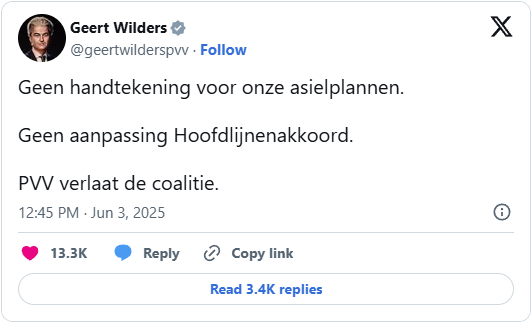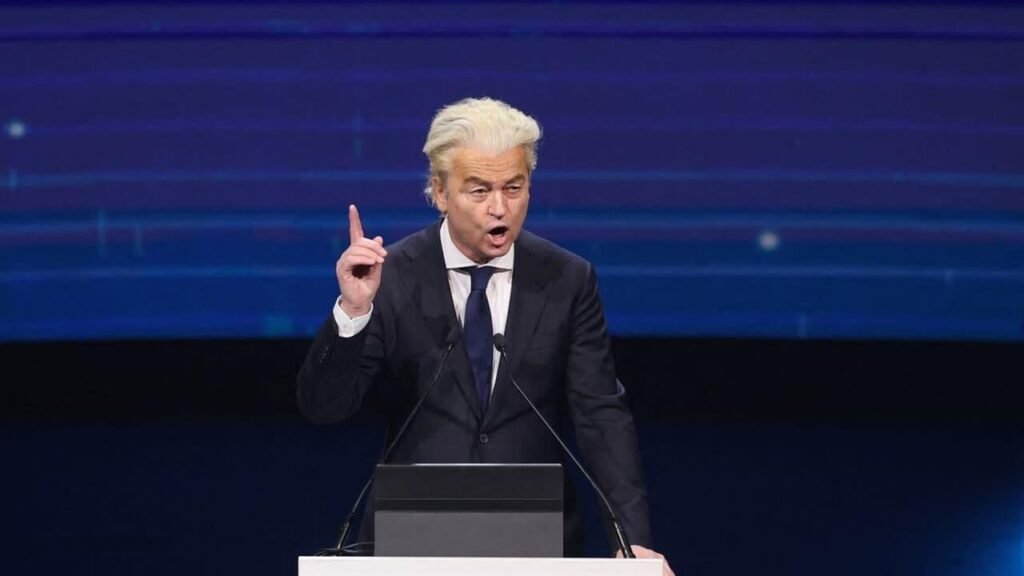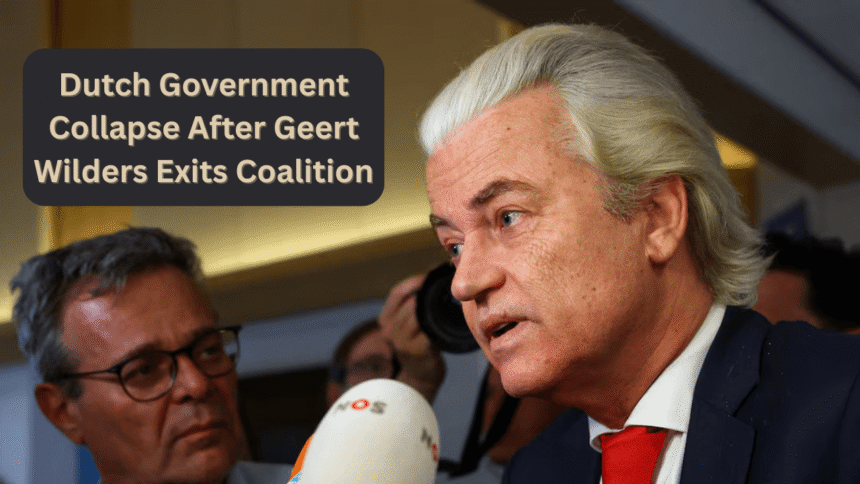The Dutch Government collapsed this week after far-right leader Geert Wilders announced his party’s withdrawal from the ruling coalition, citing irreconcilable differences over asylum and migration policies. The resignation of Prime Minister Dick Schoof and the dissolution of the government have thrown the Netherlands into fresh political turmoil, less than a year after the coalition was first formed.
Wilders, leader of the Party for Freedom (PVV), was instrumental in forming the conservative coalition that brought Schoof to power. However, persistent disagreements over handling asylum seekers and immigration limits culminated in his dramatic exit, forcing the Dutch Government to collapse. The country is now expected to head toward snap elections later this year.
A Fragile Coalition Undone by Asylum Dispute
Taking to X, Wilders announced that PVV (Freedom Party) will be leaving the coalition.
“No signature for our asylum plans. No changes to the Main Outline Agreement. PVV leaves the coalition,” stated Wilders.

The Dutch Government had been under strain for months due to internal divisions over how to deal with rising numbers of asylum seekers. The PVV, known for its hardline stance on immigration, pushed for strict caps on asylum seekers, expedited deportations, and detention centers outside the EU. Other coalition parties, including the center-right VVD and the centrist NSC, were reluctant to adopt such extreme measures, citing legal constraints and humanitarian obligations.
Despite multiple closed-door meetings and attempts at compromise, the coalition failed to produce a unified migration plan. Wilders declared that his party could no longer support a government that, in his words, “fails to protect Dutch borders and sovereignty.” Within hours of his exit, Prime Minister Schoof submitted his resignation to the king, formally marking the Dutch Government collapse.
Geert Wilders: From Kingmaker to Coalition Breaker
Wilders’ role in Dutch politics has long been controversial, but his party’s strong showing in recent elections gave him newfound leverage in shaping national policy. His insistence on reducing migration to “near zero” levels clashed not only with coalition partners but also with EU norms and Dutch law.
Observers note that Wilders’ decision to walk away from the coalition is part of a broader strategy to consolidate his base ahead of fresh elections. “He wants to lead, not just influence,” said one analyst. “Exiting now lets him campaign on the message that the other parties failed the Dutch people.”
The Dutch Government, once viewed as a pragmatic blend of conservative ideals and moderate governance, has now been pulled apart by the ideological rifts that Wilders helped deepen.
Immediate Consequences for the Dutch People
The collapse of the Dutch Government has immediate consequences for national policymaking. With the coalition dissolved, the cabinet now functions in a caretaker role, unable to pass major legislation or reforms. This paralysis comes at a critical time, as the Netherlands faces mounting economic pressures, a housing shortage, and international tensions over trade and defense.
Immigration policy — the very issue that fractured the government — remains unresolved. Refugee aid organizations warn that political instability may lead to harsher conditions for asylum seekers and delayed decision-making on existing cases. Meanwhile, Dutch cities already grappling with migrant housing shortages are bracing for further uncertainty.
Snap Elections on the Horizon

The Dutch Government’s collapse means new elections are likely to be scheduled within the next few months. Political analysts expect the next campaign to focus heavily on immigration, public safety, and national identity — issues Wilders has long championed. The PVV is expected to campaign on a narrative of betrayal by centrist parties and failure of the status quo.
However, Wilders’ polarizing reputation may also energize opposition. Green parties, social democrats, and progressive liberals are already coordinating their messaging to warn voters of a far-right takeover. Meanwhile, centrist figures like Pieter Omtzigt of the NSC may position themselves as alternatives to both extremes.
Voter sentiment remains volatile, and polling is expected to fluctuate dramatically in the weeks ahead. Regardless of the outcome, the Dutch Government’s collapse ensures that the next election will be one of the most consequential in recent history.
Broader Implications for Europe
The Dutch Government collapse has implications far beyond the Netherlands. As a founding member of the EU and one of the bloc’s economic powerhouses, the Netherlands plays a key role in shaping European migration policy. The sudden downfall of a government over asylum issues highlights the political sensitivity of the topic continent-wide.
European leaders have expressed concern over the Dutch situation, fearing that it may embolden anti-immigration movements elsewhere. Far-right parties across Europe, particularly in France, Germany, and Italy, have praised Wilders’ decision, interpreting it as a victory against what they view as “open-border elites.”
At the same time, Brussels is expected to closely monitor the upcoming Dutch elections. The outcome could alter the Netherlands’ position on EU-wide policies including climate goals, digital regulation, and security cooperation. In this sense, the Dutch Government collapse may influence the direction of European politics as a whole.
For readers monitoring political instability and its impact on global markets, checking out the JustForex Review For 2025 may offer timely insights into how forex platforms are adjusting to European uncertainty and policy shifts.
Dutch Government Collapse Reflects Deep National Divide
At its core, the Dutch Government collapse reflects the deepening divide between populist nationalism and traditional liberal governance. While many Dutch citizens express frustration with rising asylum numbers and social pressures, others worry that extreme policies risk damaging the country’s reputation as a bastion of tolerance and democracy.
This latest crisis forces the Netherlands to reexamine its identity and the kind of leadership it wants moving forward. Whether the next government leans further right, returns to center, or emerges as a new blend of forces remains to be seen. What is certain, however, is that the Dutch Government collapse marks a turning point in the nation’s political story.
For readers interested in understanding how political instability affects financial strategy and investment choices, it may be helpful to explore the Benefits of Private Equity Consulting for Mid-Sized Companies. These insights can offer strategic advantages in navigating uncertain economic environments like the one currently unfolding in the Netherlands.

